‘I am fascinated by the question of what God’s problem with poor people is’

‘Committed’ and ‘multi-pronged.’ The adjectives fit well with Dr Farid Esack, his oeuvre, and academic as well as activist engagements. He published Quran, Liberation and Pluralism in 1997; the work was noted for its academic solemnity as well as earnestness to take the message of the divine text to all it matters. In 1999, his more popular On Being a Muslim came up; the work was a personal, humorous, passionate, and politically committed take on being a believer in the age of multi-layered structures of power and domination. The rest of the works were about the Quran with a characteristic thrust on liberation and living together. Dr Farid is professor of Islamic Studies at the University of Johannesburg, South Africa; political activist known for his opposition to apartheid, his appointment by Nelson Mandela as a gender equity commissioner, and his work for inter-religious dialogue
Dr. Farid recently visited Calicut to address the Muqaddima conference organized by Students Islamic Organisation. He spoke to MUHAMMED NOUSHAD on a wide range of issues including gender, liberation theology, progressive Islam, HIV rehabilitation, political Islam, Shia-Sunni polemics, decolonizing knowledge traditions etc.
As a Muslim theologian, what is your paradigm of looking at the gender question in Islam? There have been different schools and approaches within the Muslim world to address the gender issue.
First of all, gender is one of a series of questions I am interested in or fascinated with. It is one way of looking at the marginalized. The trajectory of my personal life (justifies that perspective of looking). I started off with an awareness of the issue of race, and racial injustice. And then I did religious learning in Pakistan. I was in a madrassa for eight years. And in Pakistan I became aware of how, in many ways, there are similarities between gender oppression and my own oppression as a non-white male in apartheid South Africa. So when I went back to South Africa, much before I was engaged in the struggle for racial liberation, I started working on questions of gender justice. In many ways, I was quite instrumental in some of that work. And then I became aware of the question of HIV and AIDS. As you know, South Africa and Africa in general were very badly affected by it and the discrimination against people who are living with sexually transmitted disease and I became very involved in that.
And so, it is both the question of a comprehensive approach to injustice, of growing awareness of the different manifestations of it, and of then moving on to whatever I think as the urgent manifestations of injustice. So, the context of gender equality and the struggle for gender justice forms a path of my insistence on looking at my own theological tradition. I am a theologian and I am also a committed Muslim, whatever that may mean. That is where the question of gender fits in.
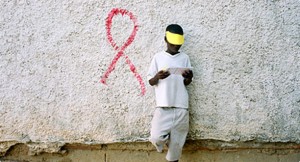
When white people and rich people contract HIV, there is medical insurance for them. There is advanced medical care. So there are structural, systemic causes underneath these things.
And then I don’t much frame the question in the context of women’s equality. I frame it in the context of gender justice. I mean, the gender question is slightly more complex than the question of women’s equality. Religious people are very good at topics like ‘the role of women in Islam’, for example. I think the question of gender in Islam is more complex; it takes on board the very idea that gender is a social construct. That the body is naturally given, but the functions assigned to the body is not. But it all takes on board the questions of masculinity and challenges traditional and religious views of what masculinity is and what the role of masculinity is. And that also touches on the different questions, for example, of the sexually assigned role to different bodies and so I insist on speaking about gender equality because I do believe that all of these things need to be considered through the lens of justice and they are all challenging. However, I don’t come to it from the angle of ‘Oops, these westerns; they problematise the role of women in Islam, let me find some quick answers for it’. That is not the position I come from.
Many Muslim societies often appear to be patriarchal and misogynist. And there are certain Muslim scholars who take the position that women’s equality is fundamentally a western agenda. They often reject the idea of gender justice, saying that it is a feminist idea. How do you take The Quran and hermeneutics to address this rejection?
I can well imagine this in a society like India or Pakistan on in the Arab world. In South Africa, it didn’t emerge as a western idea, but as a question inside the liberation struggle. And the liberation struggle wasn’t a western struggle. It was a struggle of the black people. And inside that struggle, people were making the connection between racism and sexism. So, for us, it didn’t.
Then, it is true that a particular kind of feminism has emerged in the west and the question of gender is used as a weapon with which to beat Muslims. Secondly, it is true that many of the western reform movements are contingent upon the embrace of western civilizational values and consumer values. For example, many western feminists are prepared to put a thousand different kinds of lipsticks and bikinis in front of Muslim women, from all sort of fashions, and tell them you are completely free to choose any of these. But when you say ‘no, I don’t want to choose any of this, I don’t want to chose your fashion, I don’t want to buy your concept of designing and consumerism and your notions of beauty, and I choose to wear a hijab’ – then, they say ‘no, you are not free’. So the same feminists in the vanguard of feminism will deny women their basic right of choice.
It is not unlike Lord Macaulay, who was the Governor General of Egypt in the late 1800s, standing in the forefront for the freedom for Egyptian women, and back in England, being the head of the movement that wanted to prevent women there from getting voting rights! It is again the story of Laura Bush, the Republicans who have done so much to disadvantage American women through various laws, especially Single Mothers, and posing themselves as the liberators of the women of Afghanistan. So there is a case to be made about how feminism becomes part of the machinery of occupation and wars of occupation, destroying local cultures and traditions.
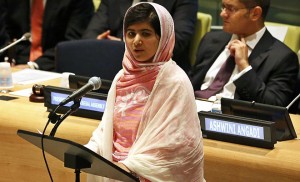
They come along and elevate the life of a single fighter for women to have access to education – Malala Yusefsai. And then they go along and destroy hundreds of schools with students in them.
At the same time, it is a fact that Muslim women are hurting, it is true. The fact that the west is exploiting the idea of oppression of our women, the fact that the west comes to us with a solution that fits into the frame of consumerism, capitalism and empire building, does not detract from the fact that inside Muslim society, as in Latino society, as in African society, as in Hindu society, and in western society, women suffer abuse at the hands of men. So, regardless of who mentions the idea first, it is a problem we must address. And we address those problems because our women are being hurt; not because they scream. When they scream, they scream selectively. They pick up the case of one woman in Nigeria, who is about to be stoned to death, and ignore the fact that there are thousands of women dying because they can’t get access to clean drinking water. As the west has introduced the idea of privatization of water those women can’t afford water. And therefore they are killing thousands of women. They come along and elevate the life of a single fighter for women to have access to education – Malala Yusefsai – and celebrate her life. And then they go along and destroy hundreds of schools with students in them through their bombing campaigns. But at the end of the day, the problem is still a problem that is ours. But not uniquely ours and the solution must be ours. But there is a problem and we don’t have to point our fingers at the west.
You mean one needs to find an approach or framework within the faith?
Within the faith and within the community. And so we need to address gender violence from a Quranic perspective and gender relations from a prophetic perspective. And there are many texts, with exceptions, that do address the question of gender violence. There are texts that address the question of male female relations, and of course there are texts that endorse patriarchy. And these texts are also to be dealt with. They must be dissected hermeneutically; they must be rethought with our own tools.
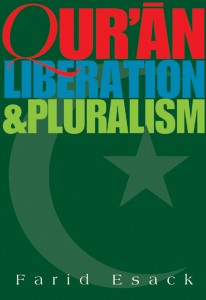
There are texts that address the question of male female relations, and of course there are texts that endorse patriarchy. And these texts are also to be dealt with. They must be dissected hermeneutically; they must be rethought with our own tools.
And I am not saying that our tools are uniquely ours. Our tools can also be learnt from others. But this idea of us learning from others and others never learning from us is very problematic. I don’t think that as believers, we should be shy from learning from others – methodologies, hermeneutical tools and so on. The larger issue is, is it a one-way street? Can the west, can the powerful, learn to become less powerful? Can they try to sell us things that don’t advance their power? And above all, can they learn from us? It is not a question of Muslims reaching at the top; it is about creating a new world where people can learn from each other. But as long as they insist on imposing their ideas in imperialistic language and pushing these ideas with imperialistic armies, our people are going to continue to resist their ideas, and, as a result, make the work of people who are genuinely committed to their communities just more difficult.
One of your major intellectual explorations has been the liberation theology of Islam. Why do you emphasis on the emancipatory potential of Quran?
I have always been religious. Not in a very casual way. My religiosity hangs very easily on me. People say I don’t look religious, I don’t act religious. And there are other set of people who get surprised, saying ‘oh this guy is religious!’ But I have always had an interest in religion; it has been a passion of mine. And I have always been deeply moved by any manifestation of injustice. And so it’s simple combining of the two passions of mine – my passion to see an elimination of injustice on the one hand and the fact that I enjoy my texts, religious books, I enjoy my tradition. I love it; I find it not only inspirational, but a very valuable tool. And it is to bring these two elements together that I find myself in this area of liberation theology. It speaks meaningfully to me. It was an invaluable tool for us in the liberation struggle of South Africa. It became real for us in mobilizing Muslims, in drawing them in hundreds and thousands to the liberation struggle. The language of the Quran kept us moving when we were in jail; it encouraged us and gave us hope. The Quran walked with us in our darkest moments. In jail we were allowed only one or two books; if you are a Christian, you were given a Bible and if you are a Muslim, a Quran. And they thought they were giving us opium, along the lines of Marxism, religion being the opium of the masses. In fact they gave us good companions. We found fascinating stories of inspiration in them, for ourselves and other people.
How to understand Islam from the margins became an obsession for me. If you look at the text from the top, you find ways to justify the status quo; but if you look at the same text from the margins you find ways to subvert the system. For me, liberation also means liberation from mankind to serve God. So it is a transcendental movement. It is also asking what is the presence of God in the midst of all this suffering.
When you look back now at the liberation theology movement, how do you see its progress and the current trends?
In South Africa, liberation theology receded. Because liberation theologians were drawn into occupying state positions. And these other people then came in. Generally in the world, the Catholic Church was also undergoing issues. There was the Cardinal Ratzinger – the pop who recently retired and I never accepted the fact that he was a pop as he was in charge of the board that decides who has become an infidel and outcast. As he was performing that role in the Church before he became the Pope, there was an antagonism towards liberation theology. As for Muslim thinkers, many progressive thinkers were sold out for other reasons. September 11 made them more interested in the questions of America, or America’s problems with Islam. So the Muslim liberation theologians started becoming more moderate and asking about Islam and violence, Islam and peace, instead of asking about Islam and imperial violence, Islam and occupations, the questions of poverty, the questions of hunger and starvation and so on. For the last while, it has been going through a difficult patch, but it is now seeing a revival in the marriage between decolonial movement and liberation theology, with the questions of urgency having been shifted to marginalized communities.
You have been active and have invested your time and effort in rehabilitating Black HIV patients. Could you say about it?
The HIV and AIDS was a dreadful thing in South Africa and the religious response in general was a very simple one – you are angering God with your sex outside marriage and AIDS is God’s punishment. For example, Malik Badari said, embarrassingly, that it is a maalika (angelic) virus that was constructed in the rectums of the homosexuals of San Francisco; this is God’s punishment coming to people. And my question has always been: what is God’s problem with black people? What is God’s issue with the poor? Are you saying that black people have more sex than white people? In Europe you find parks where people can go and have sex; there are packets of condoms hung on trees. You don’t find this in Africa. When white people and rich people contract HIV, there is medical insurance for them. There is advanced medical care. So there are structural, systemic causes underneath these things. It is like saying when an earthquake happens this is adaab (punishment) from God. When an earthquake hits in Japan, with 6.2 in the Richter scale, nobody dies. When an earthquake happens 5.6 in the Richter scale in Indonesia, thousands of people die. What is God’s issue with the people of poor countries? On the one hand you say it is a punishment from God, and it is applicable only to poor people. So there is a systemic issue. Issues of development, issues of poverty-a whole range of issues connected to all of this. The relationship between this and theology fascinated me. I got interested in HIV issues, because it was affecting the poorest of people; it was affecting black people-the most marginalized community in South Africa. By the way, in Africa it has got nothing to do with the question of homosexuality. In Europe and the US, in the beginning, it was primarily about men having sex with men. In Africa, it wasn’t. It was about mother to child transmission, or sex outside marriage, or sometimes sex inside marriage also. The vast majority of women in India, for example, who have contracted this disease, got it from their husbands.
You have been an active part of Progressive Islam. In places like Kerala, the word means a left-oriented, liberal, secular Islam, or rather a “good” Islam. What is it for you?
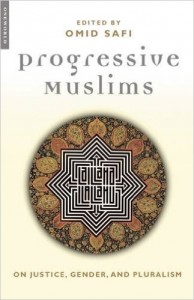
Progressive Muslim basically means anybody who is prepared to lie down and pretend to be dead as the United States and its allies walk over them, or Modi and his allies walked over them, and say ‘Islam has nothing to say about anything’ or ‘we don’t have no resistance to offer to anything
In South Africa, progressive meant, leftist, anti-imperialist, anti-west. It was after the 9/11 that the term progressive Islam was appropriated by people in the west, to mean anything and anybody that had an issue with Muslim authority. I then walked away from the term. I haven’t since identified with the term. Today, Progressive Muslim basically means anybody who is prepared to lie down and pretend to be dead as the United States and its allies walk over them, or Modi and his allies walked over them, and say ‘Islam has nothing to say about anything’ or ‘we don’t have no resistance to offer to anything, we are dead, tell us what you want us to be and we will be that.’ That is what liberal Islam means. That is what moderate Muslim means. That is what progressive Islam looks like today. So, before the 9/11, in the South African context, I was happy to be identified as a progressive Islamist. After 9/11, particularly after the release of that book Progressive Muslims, edited by Omid Safi, the term progressive was really appropriated by them and I have since walked away from that.
Now, the global north is producing the newest Islamic knowledge and thinking; English has become the first language that produces Islamic knowledge, too. The global south is often a consumer of the knowledge that the north produces. How do you look at this and what are the ways to decolonize Islamic knowledge tradition?
It is a problem. I was teaching in the United States, in Harvard University, before I came to Johannesburg, and the reason why I came back to Johannesburg was all my questions, my intellectual questions being asked inside the States, with the United States’ interests and their political questions in mind. And the questions from the third world and from the global south are a very different set of questions. Intellectual power shifted in a serious way to the west. And even our critical thinkers, scholars like Hamid Dabbashi, Ramon Grosfugel, Amartya Sen, they all find themselves in the west. It is easier for us to travel to the global north; it is more lucrative, we get paid. When you come to places like India, you have to pay your own tickets; you are lucky if you get your accommodation paid for. Last week I was in Nigeria, and you spend hours and hours traveling from airport to your hotel. And you just want to get out of this place. The traffic, the pollution, the living conditions. And that is because we have internalized the first world also. When you want to publish a book, the first thing that your publisher asks is, ‘will this book sell in America?’ If your book doesn’t sell in America, there is no way that they are going to publish your book. So, there is a real problem of the colonization of knowledge and the production of knowledge happening in the west in the academies that seemingly pretend to be neutrally and objectively functioning inside the heart of the empire and it functions as a way of carrying forward the meaning discourse of the empire.
I don’t have anything useful to say about alternatives. I think that the one thing that is good is the ongoing piracy of books, important books. Dabbashi gets pirated and becomes available in countries like this. I think that is very good, that must be encouraged. And local writers must be encouraged; local, global south writers must learn to establish their own network. It is possible through the internet where you don’t have to actually buy the books and also encourage each other to publish books locally outside the frameworks of these bigger players. I think that is the only way we can force the local sharing of knowledge and the local productions of knowledge. Because at the moment, this is like the huge pharmaceutical companies that have become monopolists. They push up the prices of all the stuff, and people cannot afford them and then it results in death. These are some of the things that can be done. But we have a very long way to go. We actually have a growing number of local writers. Unfortunately, they remain local. And there isn’t enough being made to globalise them. I, for example, am determined that I am now spending more of my traveling time in the global south. I can tell you it is a problem. In the last year I have been to three African countries. This is my second visit to India. I have been to Indonesia and some other country. I also have been to a similar number of countries in the global north. Next year I am getting seven months off, and I am spending three months in Jordan, three months in Morocco and so on. But I can tell you it is a problem. Because all the time, whenever I spend time in these countries, I have to pay and don’t get my honorarium. And I fund my foreign students through my honorariums, and now I have to figure out other means to fund my foreign students who all come from the third world. But I also have decided that I am going to be consciously recruiting in the south of India so that I can develop a stronger partnership with my university and students in the south of India. We have partnerships with the universities in the north and these are exchange and so on. But I am working on a very different pattern of partnership of actually recruiting students to South Africa where we support them in everything and occasionally send our students here and learn from the movements and the developments here.
There has been a criticism that many reformist ideas in the Muslim world are basically answers to the western issues and worries. How do you respond to this argument?
I agree. I told you I left the US because I was tired of answering western questions. That one analogy I made explains this again. If there is one woman going to be stoned then the whole world responds, but nobody cares if there are hundreds of women dying for lack of drinking water. So it is a legitimate criticism. We have our own issues – issues of poverty, issues of impoverishment, issues of exploitation of our countries by both local landlords and capitalists from abroad. We have own male-female issues. We need to work on them. We have to be careful that these issues are not being co-opted by white NGOs, because this way they ensure that their issues remain the sexy ones. A principled commitment to justice means that we will tackle these issues regardless of how and who raises them.
You have been actively organising interfaith dialogues and inter-religious solidarity programmes. How do you approach inter-faith activities?
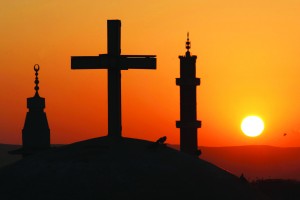
I am not interested in having tea with you and telling you how nice my religion is on the question of women and then you telling me how nice your religion is on the question of women. The problem has never been between religions, the problem has been about the exploitation of religions, and the actual injustices.
I work extensively in interfaith dialogue. But the question isn’t one of harmony. The more Christians tell me how Jesus Christ is both human and spirit and God, and how Christ became God on earth, the more confused I become. It is not a story that sits in my head. It is a story that I find utterly confusing, and the more explanations I get the more confusions I have. I don’t think that the problem between me and Christians is that we don’t understand each other. I am not interested in understanding their theology. And so the problem is not this lack of understanding between people; and the argument that only if we understand each other, the things will be wonderful, is ridiculous. In the power dynamics going on in the world today, Christianity is being invoked as a weapon of oppression, and Christianity is being invoked as a weapon of liberation. Similarly, Islam is being invoked as a weapon of oppression, and as a weapon of liberation. I am interested in how do people of different religions get together and demonstrate in their solidarity with each other the usefulness or the uselessness of their faith in combating injustice. It is on this terrain I want to see whether you are useful or not. And so I am interested in inter-religious solidarity against injustice. I am not interested in having tea with you and telling you how nice my religion is on the question of women and then you telling me how nice your religion is on the question of women. I put some nice hadith in front of you; you put some nice verses for me. And there we go home after that. The problem has never been between religions, the problem has been about the exploitation of religions, and the actual injustices that are happening in front of our eyes. And that only is the inter-religious question.
In the contemporary context how do you engage with the movements based on political Islam?
First of all I don’t know what you mean by political Islam. If by political Islam, you mean groups that are openly espousing alternatives to the current political states or groups that say we need alternative political system, like khilafat, groups such as Tafkir wal Hijra or the Muhajirun or ISIS. Are you referring to those groups as political Islam?
No. I meant the democratic and non-violent movements inspired by the intellectual pursuits of scholars like Syed Qutub and Syed Maududi.
I think that there is a desperate need for the insertion of Islam and Islamic ideas into political discourse. And I don’t think that Muslims should eschew from participating in these political discourses. I think there are paradigmatic ideas in Islam that speak to this situation. There are ideas of accountability, ideas of the common good, ideas of anathema to nepotism. There is this example of Abubaker saying that if my daughter Fatima would have been accused of this, then I would have held her to the same punishment. So that is an anti-nepotistic idea. And there is the rule that certain punishment must be suspended in the time of emergencies such as drought. The idea that if a single person dies in a neighborhood of hunger, all the neighbors of 40 houses in all directions will be held accountable. There are these social ideals that can be translated into serious political ideas and practice. And so I don’t advocate the separation of religion from politics. I think that religious people must intervene in political matters. And they can even intervene as politicians.
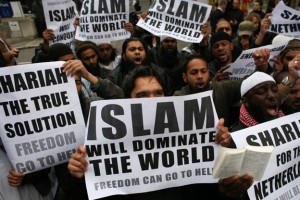
I am particularly afraid of the states that they get their mandate from beyond human authority. Because once you tell me that God has told you something, then there is no space for me, if I don’t share your God, in that conversation.
I don’t subscribe to the idea that politics is a dirty game. I think there are many decent politicians, certainly in my part of the country, who are genuinely interested in people’s issues, and still working and transforming the lives of people. It is all well for moralists to walk around and say I don’t want to be in politics, all these politicians are corrupt. If all of us have to go to the toilet, somebody has to clean the toilet; somebody has to manage the cleaning of toilets and this is what politicians do. Managing the consequences of human shit. Of course in many corrupt societies, there is a lot of money in it. I am just talking about politics in general. I think Muslims should enter politics and there are Islamic ideas on politics. Does this mean Muslims should aspire for an Islamic state? No, I don’t agree with that. You try to insert Islamic values in your society.
I am not even sure if I am a particular fan of the state itself. The state is a relatively new invention. There are many other ways in which people have found ways to govern themselves. I think those smaller cooperative units, there are different models, I haven’t really thought through. But I think there is a need for a legitimacy of Muslims inserting religious values into the discourse on the state, intervening in actual public debates on policies and even becoming engaged in politics themselves.
I am always afraid of states, especially large ones, and I am particularly afraid of the states that they get their mandate from beyond human authority. Because once you tell me that God has told you something, then there is no space for me, if I don’t share your God, in that conversation. This is like Zionists saying, our God whispered to us one night that this piece of land is yours even though that piece of land happened to have had millions of other inhabitants who have lived there for thousands and thousands of years uninterruptedly. And because of the promise your God made to you, you can come there today and become a citizen. And that state must engage in continuous move to bring in more Jews and to engage in ethnic cleansing to reduce the Palestinian population. That is the nature of religious states. There is no space for democracy, equality. All the religious states are deeply flawed, and I am not a friend of any big state, I am not a friend of the ethnic state, I am not a friend of religious states.
In Muslim community, there is also a Shia-Sunni polemics, both in theological and political level. There are Sunnis who argue that Shiism is historically a Jewish construct to destabilize Islam.
First of all, India and Pakistan and much of the Muslim world, are very rich with conspiracies. There are at least a couple of conspiracies hiding under every bed. When I was teaching many years ago in a religious school, some Shia friends told me that the Sunni Muslims fold their hands while they pray because there they hide their idols they worship. And in the madrassa I was again taught that the Shias, in the night of Ashura, switch off the lights in the second part of the ceremony, so that they can have lots of sex orgies. A 16 year old boy hearing this in a madrasa might even think ‘I wish I were a Shia to have endless sex on those nights’! There is no basis for this. Most of the times these are the lies we spread of each other. And it is very insulting that your faith must sustain on your ability to tell lies about another community.
And the Sunni-Shia tensions at a larger level are also reflective of the political tensions that are happening inside the Muslim world. The truth is that whenever anything happens that threatens power, people will find ways to demonize each other. Whether it is accusing a sex scandal about somebody or saying somebody is a Mossad agent or so. There are theological differences between Sunnis and Shias. But anybody who has eyes can see that it is on the whole the Sunni countries that have aligned themselves with the United States and Israeli interests in the Middle East for better or worse. And there is Iran, Lebanon which is a bi-sectarian country and Syria to an extent that have consistently aligned against American interests. Iraq used to be anti-US when Saddam Hussain was there. On the Sunni side, of course, Hamas has also been very consistent in its opposition to Zionism. I am not saying that all the Sunnis are bad. The part of the vilification of Syria, and Iran at the moment – in Syria there is an excuse of having an undemocratic government, in Iran, much less so – is mostly based on their Shiite leadership. So this is sectarianism.
South Africa is a multicultural society and you have religious Muslims accepted at very high ranks, the most visible example being your bearded cricket captain. In countries like India, in spite of being secular and plural, the Muslim identity is often at stake and the so-called mainstream is not culturally inclusive.
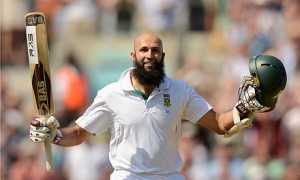
In South Africa, secularism is not a God to be worshipped. Religion is something to be respected. People’s beliefs and non-beliefs are something to be respected
Not only do we have a bearded cricket captain. The Speaker of Upper House is a muhajaba; the minister of science and technology is a muhajaba; our minister of economic development is a muhajaba; many of our deputy ministers are muhajaba; there is a musalla inside parliament itself. Our ambassador to Washington DC is a religious Muslim. The minister of transport is a Tablighi with his bog kurta and jubba and 40 days jamaat. In South Africa, secularism is not a God to be worshipped. Religion is something to be respected. People’s beliefs and non-beliefs are something to be respected. And by respecting it, we give some space in the public domain. The African National Congress, the ruling party, had their national cadre conference recently, and I was asked to open the meeting with a prayer. A Muslim was asked to open it with a prayer. Nobody objected.
In India, secularism is presented as a means of maintaining the balance of forces between different religious groups, and controlling those balances of forces in theory. In practice, it is used as a weapon to demonize religious minorities, and to privilege one religion over others.






















Connect
Connect with us on the following social media platforms.